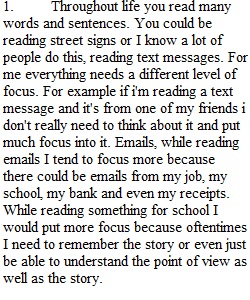


Q Overview We talked a little bit in class last week about your experiences with rhetorical analysis. You've also begun some of that work for your "I Stand Here Ironing" assignment. To help us think more deliberately about our personal reading habits in preparation for our forthcoming assignments, please answer the following questions. Questions 1. How would you describe your reading habits when reading something NOT for school? What kinds of materials/texts do you read on a regular basis (including anything you read in print/hard copy, online, and on social media)? Are your habits when reading one kind of text different from your habits when reading another kind of text? (e.g., do you read a magazine article the same way you do a social media post?) When I say habits, I am referring to your environment (are you in a quiet room, a crowded room, do you have headphones or the TV on?, etc.) as well as your approach--are you fully concentrating? what things are you looking for, thinking about, remembering, noting, etc. when reading? 2. Now think about your reading habits when reading something FOR school: answer the questions above and add anything else that seems relevant regarding your habits and approach to reading when reading for school. 3. Now take a minute to think about how your responses to the first two questions compare and what insight they may offer you: to what extent does the motivation for or purpose of reading shape your habits? That is, when you're reading for yourself (not for school), are you more relaxed, more focused, something else? Are you paying more or less attention to the details than when reading for school? How might your mindset or attitude change when you compare your habits reading for school and not for school? 4. What does it mean to you to read critically, and/or to read rhetorically? (If you aren't sure, just say so!) 5. When reading Tillie Olsen's "I Stand Here Ironing," what kinds of things about the text stood out to you? What aspects of the text are particularly interesting--or not--to you? How easy or challenging would you say it is to comprehend fictional texts like this story? How easy or challenging would you say it is to discern what is likely significant or meaningful about a short story? 6. How would you describe the characteristics of fictional stories (or literary texts), and how would you describe the characteristics of nonfiction essays (or nonliterary texts)? How might you read a short story differently from a nonfiction text, like a news or scholarly article? Does one set of reading habits better fit for one type of text than another? 7. When you read nonfiction texts, like an news article or a textbook chapter, what kinds of things do you look for? How do you know what to look for? (how to discern what's most important or worth remembering?) 8. If the questions above have prompted additional ideas or reflections on your part, please share them here! PreviousNext
View Related Questions